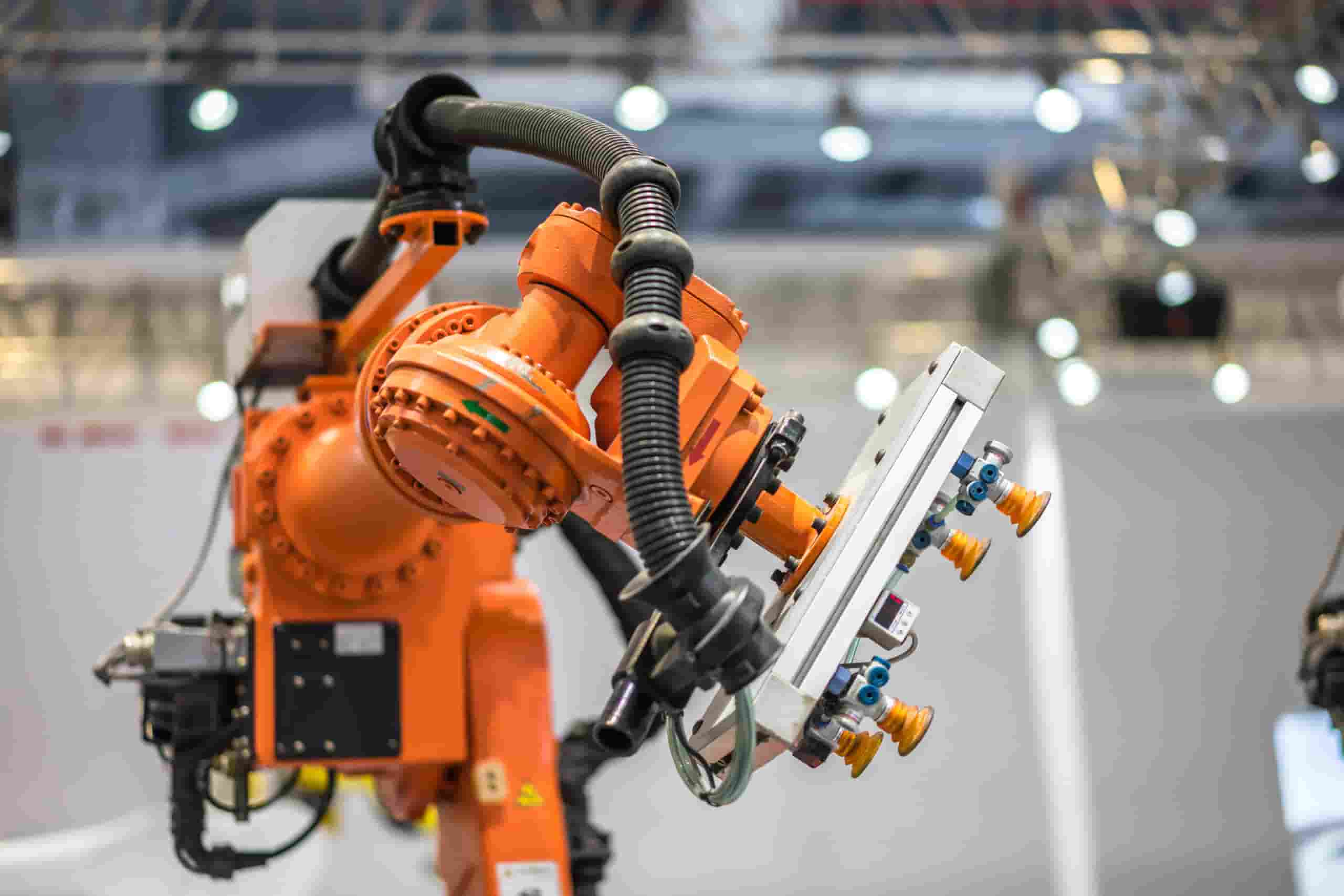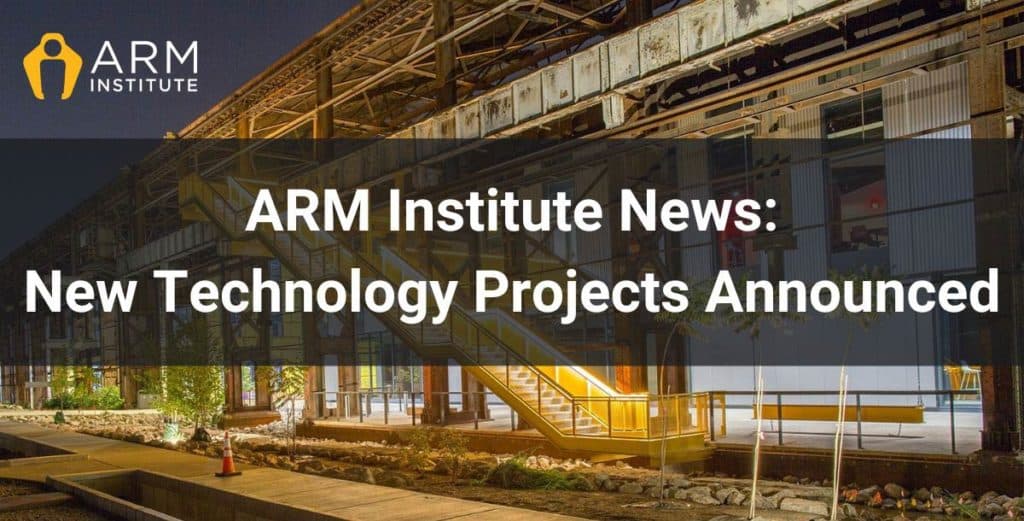ARM Institute Funds Eleven New Technology Projects
The ARM Institute will award $7.9M across eleven projects that address critical advanced manufacturing needs.
January 26, 2023 – The ARM (Advanced Robotics for Manufacturing) Institute is pleased to announce the selection of eleven new technology projects on robotics. ARM Institute projects bridge the gap between industry, government, and academia to spur critical innovations in advanced robotics for manufacturing.
ARM Institute projects are selected from the Institute’s Project Calls that address critical areas of need in U.S. manufacturing. Project Calls are crafted in collaboration with the ARM Institute’s internal team of experts, ARM Members, and our Department of Defense collaborators.
The ARM Institute plans to award nearly $7.9M in project funding, for a total contribution of approximately $16.6M across these eleven technology projects. To date, the ARM Institute has invested in over 120 robotics technology and workforce development projects.
These projects were funded through an ARM Institute Technology Project Call (ARM-TEC-22-01), which focused on the following special topic areas:
- Adaptive Real-Time Path Planning and Control
- Human Action & Intention Prediction
- Robot Learning
- Feature and Pose Recognition and Estimation
- Virtual Commissioning of Advanced Robotic Systems
- Artificial Intelligence (AI) and Data for Advanced Manufacturing Robotic Systems
- Multi-Agent Motion Planning and Tasking for Discreet and Continuous Manufacturing Processes
- Virtual Masking for Advanced Coating Applications.
“Each of these projects address critical areas of need in robotics for both the Department of Defense and industry,” noted Dr. Chuck Brandt, ARM Institute Chief Technology Officer. “The project teams epitomize the strength of the ARM Institute’s member ecosystem and the importance of bridging the gap between non-traditional collaborators.”
Each technology project is briefly described below:
Ceramic Matrix Composites Pick, Place, and Form Automation
Principal Investigator: Boeing
Project Team: University of Southern California, and 3M
Project Description: This project seeks to develop adaptive path planning to ensure affordability of Ceramic Matrix Composites (CMC) components for hypersonic platforms, or an object that exceeds 5 the speed-of-sound (Mach 5 or greater). The project also seeks to integrate improvements to automated pick, place, and form for processing CMC fabric prepregs using 3D vision-based sensors to reduce the cost and variability for high-rate production of CMC structures. Benefits of this approach include having a cost-competitive alternative to titanium, higher processing efficiency, and applications for other materials and processes.
Rapid Welding of Thermoplastic Composite Structure
Principal Investigator: Raytheon Technologies Research Center
Project Team: Carnegie Mellon University, Wason Technology LLC, and Collins Aerospace
Project Description: Lightweight carbon fiber reinforced thermoplastic composites (CF-TPCs) are internationally recognized as a material capable of meeting the future aerospace market high-rate demands and providing sustainability benefits. One key contributor to the rapid manufacturing rate of CF-TPCs is its capability to be welded instead of using traditional time-consuming adhesive bonding and or mechanical fastening. Currently, three heat generation methods dominate the application and development of welding TPC; however, currently these are mostly not accepted for complex aircraft structures. This project seeks to catalyze robotic automation for rapid ultrasonic welding of TPC components. These innovations are expected to lead to increased welding speed, applicability to a wider range of products, reduce the assembly time, and reduce the number of welding trials and process calibration articles.
Agile Automated Visual Inspection
Principal Investigator: GE Research
Project Team: University of Washington, and GKN Aerospace Defense
Project Description: Accurate visual inspection of components is critical to safety in aerospace and is often the limiting factor in manufacturing processes, especially for composite components. Current processes are time-consuming, manual, subjective, often inaccurate, and require extensive training. This project seeks to build an agile, automated visual inspection system that reduces the set-up time for new part geometries through automated surface portioning and the integration of intelligent lighting, enables real-time decision-making for optimized imaging, and provides an automated and robust defect recognition and classification system leveraging artificial intelligence (AI).
Convergent Manufacturing using Multiple Industrial Robots
Principal Investigator: Rensselaer Polytechnic Institute
Project Team: GE Research, Wason Technology, Yaskawa, and Southwest Research Institute (SwRI)
Project Description: This project seeks to enable convergent manufacturing through coordinated motion of multiple robots for accurate and fast relative tool motion to perform additive, subtractive and transformative manufacturing tasks. The outputs from this project will enable the manufacturing of parts using robots from multiple vendors with high accuracy and quality, empower manufacturing engineers to make better process decision and adjustments, and save time through automated motion programming. This project will build on the outputs of several previous ARM Institute projects, including Robot Raconteur.
Virtual Commissioning of Vision Systems (VCVS) for Industrial Robotic Inspection Applications
Principal Investigator: Siemens Corporation
Project Team: The Boeing Company and Premier Automation
Project Description:The installation or modification of robotic image acquisition systems for production line inspections can be tedious manual processes that require full-time human expertise from different domains, such as lighting, cameras, robotics, automation, AI, and the production process. This project seeks to leverage digital twins to reduce the amount of effort, time and training data required to automate visual inspections, enabling wider implementation of inspection systems for industrial applications. The outputs of this project seek to reduce commissioning effort for inspection systems, reduce real cell data required to train AI inspection models, and alleviate production bottlenecks due to labor shortages.
Robotic 3D Sewing for Clothing
Principal Investigator: Siemens Corporation
Project Team: Sewbo, Levi Strauss, Bluewater Defense, Saitex USA, and ISAIC
Project Description: Since 2018, the ARM Institute has completed several robotics projects that have significantly advanced the state of the art in robotic sewing. This project seeks to build on these previous robotic sewing technologies by automating sewing in a 3-dimensional space to augment human operators for common behaviors associated with garment assembly such as pickup, alignment, and the sewing of workpieces with complex 3D shapes. The system will be based on edge AI (object pose estimation) and advanced control (3D sewing). Beyond sewing, this technology will have applications in industries that require the handling of flexible materials, like aerospace.
AI-based Robotic Metrology for Reducing Large Metal Fabrication Deformation
Principal Investigator: ARIS Technology
Project Team: Oshkosh, Yaskawa, Southwest Research Institute (SwRI), Carnegie Mellon University, and Plectix Robotics
Project Description: This project seeks to develop an AI framework through the training of AI models to reduce deformation in metal fabrication. The project team will do this by developing structures, standards, and practices for collecting and managing data for AI-based deformation reduction and using this data to close the loop for in-process sensing. These outputs are expected to improve quality, reduce training dataset requirements, reduce costs, and save time.
Collaborative Robotic Process Planning for Surface Treatment of Complex Components
Principal Investigator: Ohio State University
Project Team: Southwest Research Institute (SwRI), Yaskawa, and Northrop Grumman
Project Description: This project will develop an augmented reality (AR) environment with natural language interaction and gesture recognition to provide an intuitive interface for advanced toolpath planning for robotic surface treatment of complex geometries. The environment will utilize a fast-acting spray model to predict process results to guide the user and train machine learning algorithms to generate continually improving process plans. This project aims to reduce setup time and improve quality for surface-based processing operations on low volume, high mix components.
Multi-Robot Task Planning in Large Structure Manufacturing
Principal Investigator: Rensselaer Polytechnic Institute
Project Team: Anchor Industries and Pvilion Technologies
Project Description: This project seeks to develop an advanced motion planner for multi-robot missions with temporal constraints and solve for optimal, collision-free robot trajectories to complete the task. The work on this project builds upon previous work performed by the project team, which built a multi-robot fabric manipulation system. The project outputs are expected to improve and simplify the programming of multi-robot systems in large structure manufacturing.
Fixtureless Robotic Assembly and Manufacturing Environment (FRAME)
Principal Investigator: Lockheed Martin
Project Team: University of Southern California, Carnegie Mellon University, and CapSen Robotics
Project Description: This project seeks to build a configurable robotic system for fixtureless and dynamic high mix/low volume (HMLV) manufacturing that identifies/inspects assembly parts, autonomously plans motion and tasks, and optimizes human collaboration with the robotic manufacturing cell. By eliminating fixturing, this project enables rapid cell repurposing and reduces production costs. To reinforce cell agility and throughput, task planners will take in high-level assembly instructions and decompose tasks between humans and robots based on operation complexity.
Hierarchical Robot Learning Framework Based on Reinforcement Learning for Decision Making and Control
Principal Investigator: General Motors
Project Team: GE Research, University of Virginia, and Siemens Corporation
Project Description: This project seeks to employ a Reinforcement Learning (RL) algorithm to allow manufacturing robotic systems to perform new tasks with minimal or no manual intervention. The team will do this by building a hierarchical RL framework in which expert knowledge, historical data, and digital twins are used to effectively learn manipulation policies to perform unstructured tasks. These outputs are expected to reduce the time and cost of implementing flexible automation.
What You Need to Know About ARM Institute Technology Projects
These tech projects not only address critical needs in the industry but also exemplify the collaborative spirit between academia, government, and the private sector. With an investment of nearly $7.9M across eleven projects, the ARM Institute is steadfast in its commitment to driving technological advancements that will shape the future of manufacturing in the United States. Stay tuned for more updates as we continue to bridge the gap between concept and application, making technology projects a reality for the betterment of our economy and national security.
About the ARM Institute
The Advanced Robotics for Manufacturing (ARM) Institute is a Manufacturing Innovation Institute (MII) funded by the Office of the Secretary of Defense under Agreement Number W911NF-17-3-0004 and is part of the Manufacturing USA® network. The ARM Institute leverages a unique, robust, and diverse ecosystem of 300+ consortium members and partners across industry, academia, and government to make robotics, autonomy, and artificial intelligence more accessible to U.S. manufacturers large and small, train and empower the manufacturing workforce, strengthen our economy and global competitiveness, and elevate national security and resilience. Based in Pittsburgh, PA since 2017, the ARM Institute is leading the way to a future where people & robots work together to respond to our nation’s greatest challenges and to produce the world’s most desired products. For more information, visit www.arminstitute.org and follow the ARM Institute on LinkedIn and Twitter.
Join Our Mailing List

